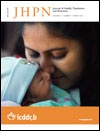White Blood Cell Count in Women: Relation to Inflammatory Biomarkers, Haematological Profiles, Visceral Adiposity, and Other Cardiovascular Risk Factors
DOI:
https://doi.org/10.3329/jhpn.v31i1.14749Keywords:
Angiotensin ?, C-reactive protein, Interleukin 6, Obesity, White blood cell countAbstract
The role of white blood cell (WBC) count in pathogenesis of diabetes, cardiovascular disease, and obesityrelated disorders has been reported earlier. Recent studies revealed that higher WBC contributes to atherosclerotic progression and impaired fasting glucose. However, it is unknown whether variations in WBC and haematologic profiles can occur in healthy obese individuals. The aim of this study is to further evaluate the influence of obesity on WBC count, inflammatory biomarkers, and metabolic risk factors in healthy women to establish a relationship among variables analyzed. The sample of the present study consisted of 84 healthy women with mean age of 35.56±6.83 years. They were categorized into two groups based on their body mass index (BMI): obese group with BMI >30 kg/m2 and non-obese group with BMI <30 kg/m2. We evaluated the relationship between WBC and platelet count (PLT) with serum interleukin 6 (IL-6), Creactive protein (CRP), angiotensin ? (Ang ?), body fat percentage (BF %), waist-circumference (WC), and lipid profile. WBC, PLT, CRP, and IL-6 in obese subjects were significantly higher than in non-obese subjects (p< 0.05). The mean WBC count in obese subjects was 6.4±0.3 (×109/L) compared to 4.4±0.3 (×109/L) in non-obese subjects (p=0.035). WBC correlated with BF% (r=0.31, p=0.004), CRP (r=0.25, P=0.03), WC (r=0.22, p=0.04), angiotensin ? (r=0.24, p=0.03), triglyceride (r=0.24, p=0.03), and atherogenic index of plasma (AIP) levels (r=0.3, p=0.028) but not with IL-6. Platelet count was also associated with WC and waist-to-hip ratio (p<0.05). Haemoglobin and haematocrit were in consistent relationship with LDLcholesterol (p<0.05). In conclusion, obesity was associated with higher WBC count and inflammatory parameters. There was also a positive relationship between WBC count and several inflammatory and metabolic risk factors in healthy women.
J HEALTH POPUL NUTR 2013 Mar;31(1):58-64
Downloads
609
440

